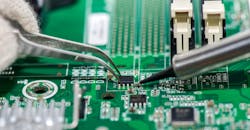The Electronic Components Industry Association (ECIA) has issued a warning from its Chief Counsel, Robin Gray, on the increasing threat of counterfeit parts getting into the supply chain during component shortages. ECIA encourages the electronics industry to continue to rely on the authorized channel for components, and to report any counterfeit component activity to the Department of Justice.
ECIA is tracking the challenges the industry faces due to component shortages, especially in passives such as multi-layer ceramic capacitors and certain semiconductors. Gray said that the ECIA’s component supplier member community is working on alleviating these issues. Long lead times and allocation conditions in the electronics supply chain are expected to continue throughout most of 2018, say industry executives.
ECIA is concerned that these conditions will force customers to consider alternative and unauthorized sources for these critical components in order to meet their own production commitments. This is understandable, but increases the risk to the industry and the consumer that counterfeit components will get into the supply chain.
The Department of Justice is also concerned about the risks to the public. The following is a statement from a recent grant proposal to the law enforcement community from the Department of Justice:
The threat to United States interests from IP theft has evolved. The increasing perpetration of illegal and damaging acts of IP theft not only costs the U.S. economy tens of billions of dollars per year, but it also deprives individuals of their livelihoods, and poses a public safety and health threat. Counterfeit goods traditionally were limited to luxury goods such as handbags and watches. However, with the advent of new technologies, combined with the high profits and perceived low risk from selling infringing goods, counterfeits have become increasingly more sophisticated and prevalent. Products in every industry—from food to health care products to electronics—now are being counterfeited. Counterfeit pharmaceuticals may contain a dangerous incorrect dosage of medication or harmful contaminants. Automobile parts may make vehicles unsafe, aircraft parts may fail in flight, or electrical components may catch fire. Average consumers are incapable of determining whether the goods they purchase pose a risk or the nature of the risk.
The widespread availability of the internet has contributed to the increasing threat, enabling manufacturers to sell counterfeit products to customers around the world, and helping criminals to breach or avoid legitimate supply chains for products. The impact of the internet is particularly noticeable in the pharmaceutical, automotive parts, and electronics industries. Offenders are creating websites that appear legitimate and deceiving consumers into purchasing counterfeit goods. Because of the anonymity of the internet and the ability of counterfeiters to disguise the true nature of the goods they offer online, consumers are hampered in their ability to make rational choices.
With the Justice Department’s increased awareness of the problem comes increased enforcement efforts. For example, an arrest was recently made in Orange County, California, in connection with an electronics distributor allegedly selling counterfeit integrated circuits with military and commercial uses. The charges were leveled against the owner of PRB Logics Corporation, an Orange County-based seller of electronic components
Rogelio Vasquez was charged in a 30-count indictment that alleges he acquired old, used and/or discarded integrated circuits from Chinese suppliers that had been repainted and remarked with counterfeit logos. The devices were further remarked with altered date codes, lot codes or countries of origin to deceive customers and end users into thinking the integrated circuits were new, according to the indictment. Vasquez then sold the counterfeit electronics as new parts made by manufacturers such as Xilinx, Analog Devices and Intel.
Vasquez, who is also known as “James Harrison,” is expected to be arraigned on the indictment in United States District Court in Santa Ana. The indictment charges Vasquez with nine counts of wire fraud, 20 counts of trafficking in counterfeit goods, and one count of trafficking in counterfeit military goods.
The charge related to counterfeit military goods alleges that Vasquez sold eight integrated circuits that appeared to be manufactured by Xilinx, knowing that such goods were counterfeit military goods, the use of which could cause the disclosure of classified information, impairment of combat operations, and other significant harm to a combat operation or national security.
The wire fraud charges allege that Vasquez instructed his Chinese suppliers to remark ICs and also instructed a testing laboratory in China to provide two versions of its report – one of which accurately showed integrated circuit test results and the second of which was a “sanitized version” that did not contain results of any visual inspection and permanency or other marking tests, which would have revealed that the ICs were used and remarked.
The charges of wire fraud and trafficking in counterfeit military goods each carry a statutory maximum sentence of 20 years in federal prison. Each count of trafficking of counterfeit goods carries a maximum possible penalty of 10 years in prison. The investigation into Vasquez and PRB Logics is being conducted by U.S. Immigration and Customs Enforcement’s Homeland Security Investigations; the Defense Criminal Investigative Service; and the National Reconnaissance Office, Office of Inspector General.
The criminal case is being prosecuted by Assistant United States Attorney Lisa E. Feldman of the Cyber & Intellectual Property Crimes Section. The complaint seeking the forfeiture of the seized funds was filed by Assistant United States Attorney Steven R. Welk, Chief of the Asset Forfeiture Section.
About the Author

Sam Davis
Sam Davis was the editor-in-chief of Power Electronics Technology magazine and website that is now part of Electronic Design. He has 18 years experience in electronic engineering design and management, six years in public relations and 25 years as a trade press editor. He holds a BSEE from Case-Western Reserve University, and did graduate work at the same school and UCLA. Sam was the editor for PCIM, the predecessor to Power Electronics Technology, from 1984 to 2004. His engineering experience includes circuit and system design for Litton Systems, Bunker-Ramo, Rocketdyne, and Clevite Corporation.. Design tasks included analog circuits, display systems, power supplies, underwater ordnance systems, and test systems. He also served as a program manager for a Litton Systems Navy program.
Sam is the author of Computer Data Displays, a book published by Prentice-Hall in the U.S. and Japan in 1969. He is also a recipient of the Jesse Neal Award for trade press editorial excellence, and has one patent for naval ship construction that simplifies electronic system integration.
You can also check out his Power Electronics blog.
